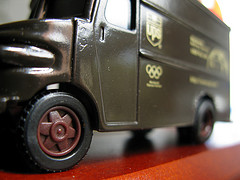UPS Doesn’t Offer “Insurance,” Even If An Employee Tells You It Does
San Francisco’s KPIX-TV recently spoke to an area man who thought he was buying insurance coverage from UPS on a shipment of two headlights. He says he’d already repacked the lights in their original packaging, thrown in a bit more foam padding and newspaper for good measure, but decided to fork over some more money for the extra peace of mind.
When one of the headlights arrived broken, he attempted to make a claim but it was denied because his package had included the newspaper padding inside. That’s when he fell into the Declared Value rabbit hole.
FIND THE FINE PRINT
See, UPS doesn’t actually sell insurance coverage on the packages you ship. Instead, it sells “Declared Value Coverage,” which allows the shipper to make a claim for the full declared value of the package (up to $50,000), so long as the packaging meets UPS standards.
The lengthy UPS Terms document [PDF] even states, somewhere on page #35, that Declared Value Coverage is not insurance:
“When a shipper declares a value in excess of $100, it does not receive any form of insurance. Shippers desiring cargo insurance, all risk insurance, or another form of insurance should purchase such insurance from a third party.”
Of course, for as detailed and lengthy as the Terms of Service are, the document points back to the UPS website when describing what isn’t covered by Declared Value:
–loss or damage resulting from improper, inadequate or unsafe packaging or wrapping that fails to meet UPS’s published standards related thereto set forth in the Terms or at ups.com
And so the fun begins at UPS.com, where there are multiple pages with shipping guidance.
Nowhere on the page with guidelines for preventing damage claims does it say that newspaper would be a reason for denying a claim.
Nor does it say anything on UPS.com’s FAQ about Declared Value Coverage, other than to say that its claims people use ISTA 3A standards for determining whether a package was properly put together.
There’s the Packaging Guidelines page, which only says “Use adequate cushioning material” and does not call out newspaper as a no-no.
Then there is the Packaging Materials Page, which doesn’t list any forbidden packaging but does link to further pages about acceptable materials. Following the link to the Loose Fill page brings up nothing about newspaper, even though we’d describe it as a “lightweight, non-fragile” material.
To get an indication that newspaper may void your claim — though it doesn’t say this explicitly — you have to go the Internal Packaging page, which lists both Kraft paper and “paper cushioning” as acceptable. However, each of those paragraphs include the qualifying parenthetical of “(not newspaper or newsprint).”
Finally, we stumble upon UPS.com’s step-by-step guide to packing your shipment, where on page 2 it reads, “Improper cushioning material includes clothing, blankets, towels, newspaper/newsprint, and pillows.”
Phew!
WHAT’S IN A NAME?
KPIX-TV went undercover to three separate UPS Store locations in the San Francisco area, and at each store the employee attempted to upsell them on “insurance” coverage, never mentioning Declared Value.
The UPS Store claims that it trains employees to use the phrase “Declared Value Coverage,” but says that “Unfortunately, there may be times when an employee thinks it’s easier to refer to it as insurance.”
Which is like those times when I find it easier to refer to myself as Ryan Gosling, because we’re both human and male, which makes us virtually identical in the big picture.
MAY WE MAKE A SUGGESTION?
If UPS and the UPS Store really want to stop this confusion, they will not only train employees to not say “insurance,” but will also train them to clearly explain the difference between the two.
Furthermore, the company could provide employees with a list of immediate no-nos that would allow the customer to know that his Declared Value claim stands a high risk of being denied. It could be a piece of paper or a poster that says something like, “If your package has any of the following… it is not considered properly packaged by UPS standards.”
But of course then UPS wouldn’t get to upsell an all but useless coverage to unwitting customers.
Want more consumer news? Visit our parent organization, Consumer Reports, for the latest on scams, recalls, and other consumer issues.


